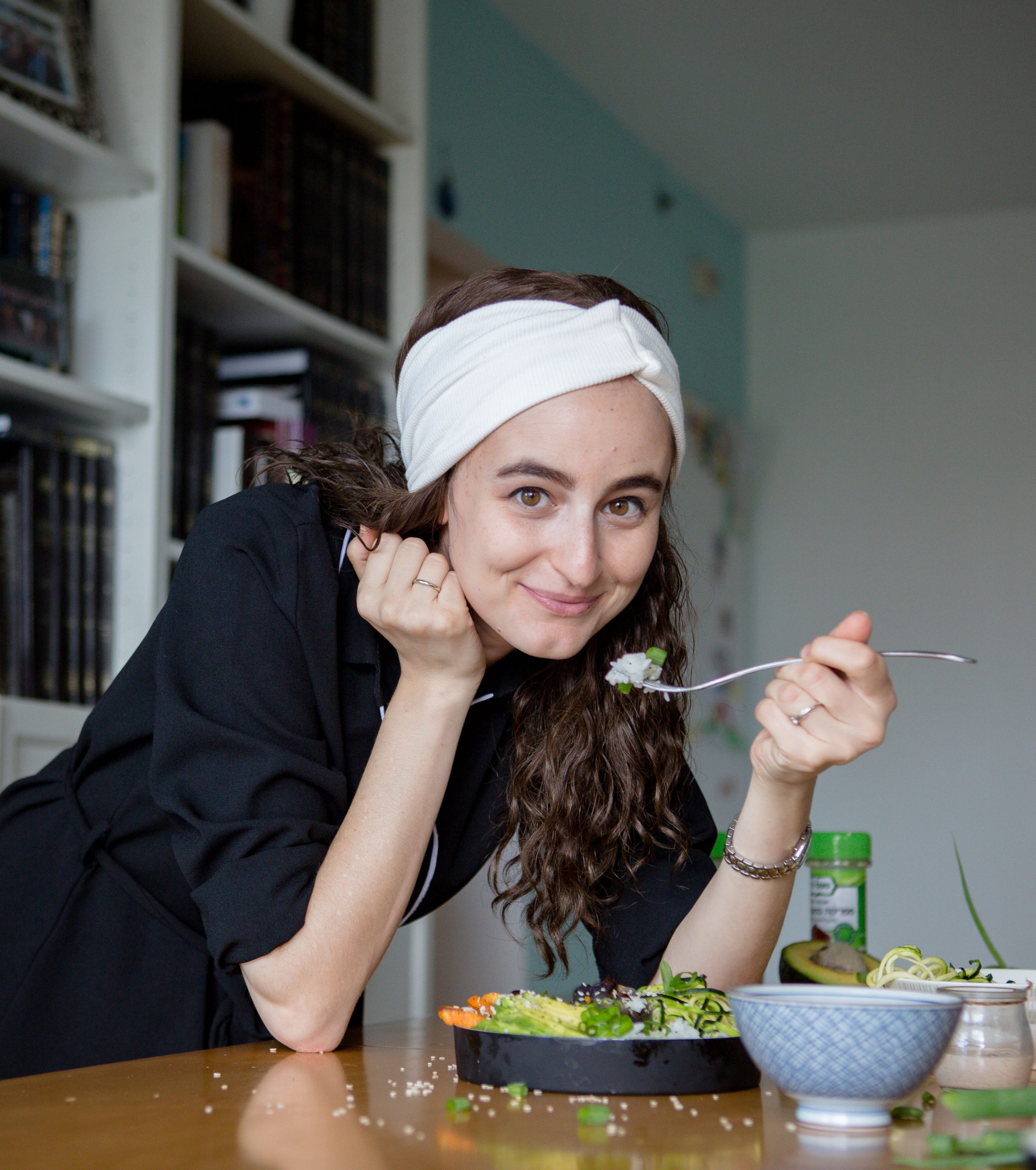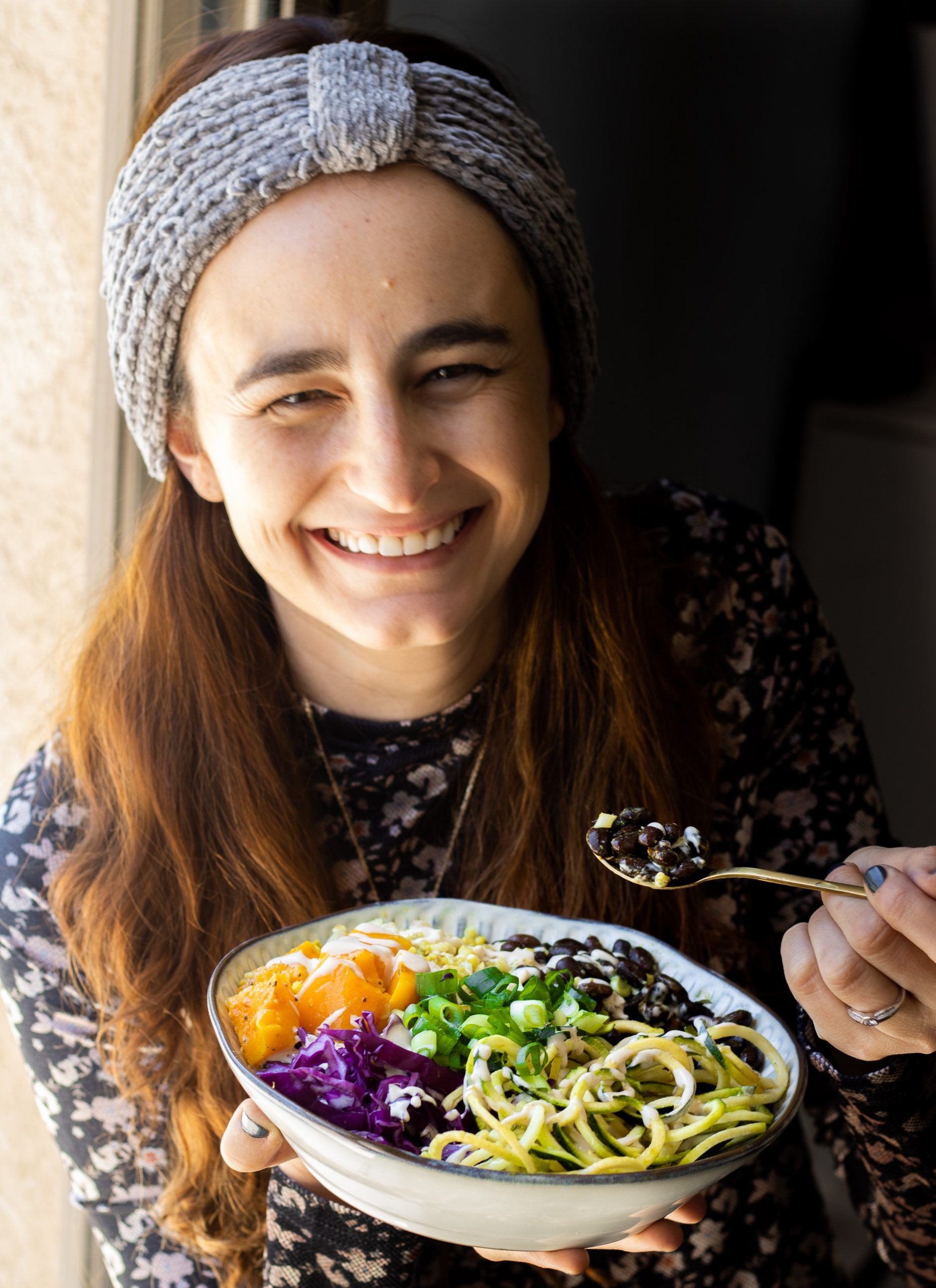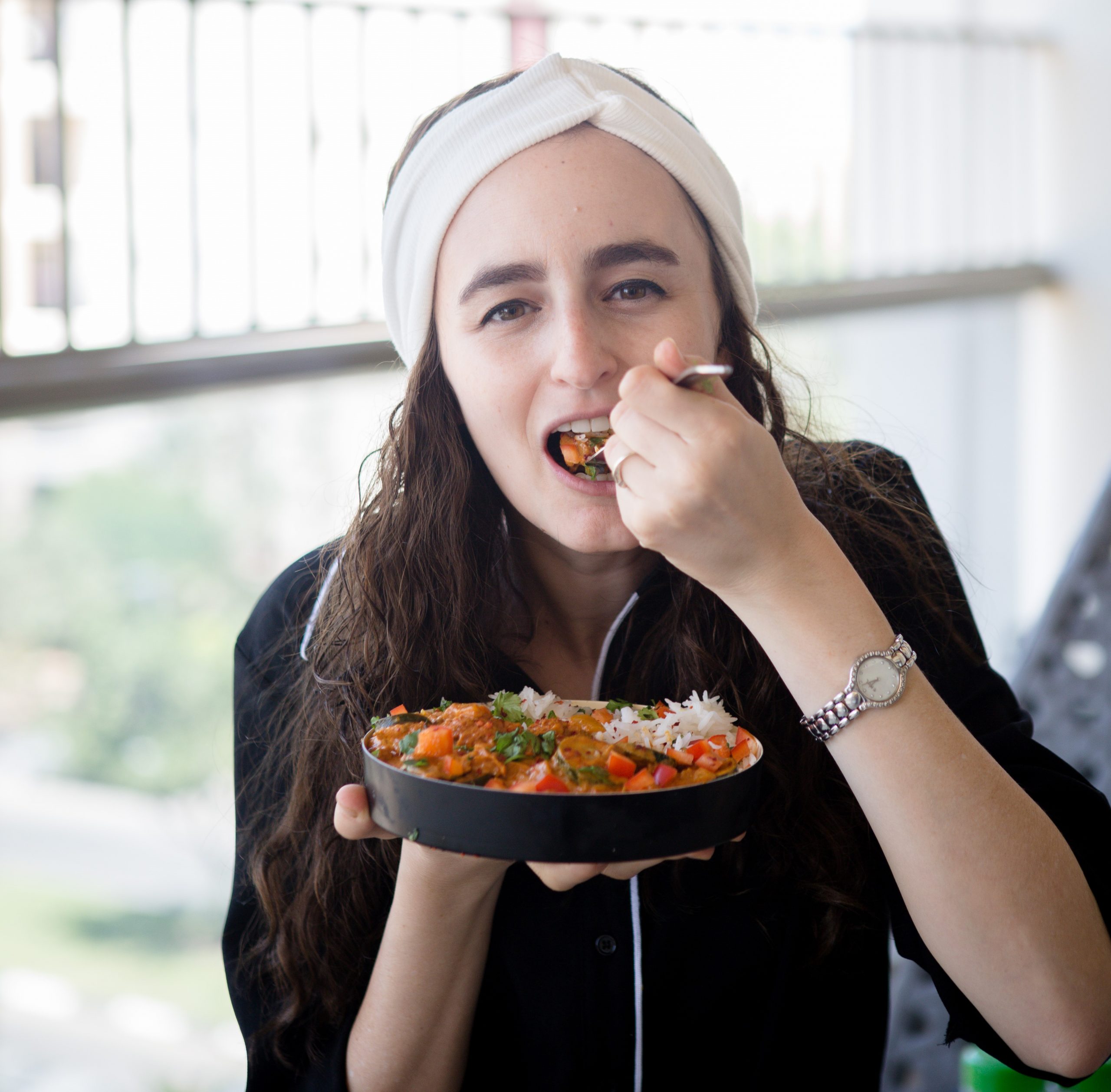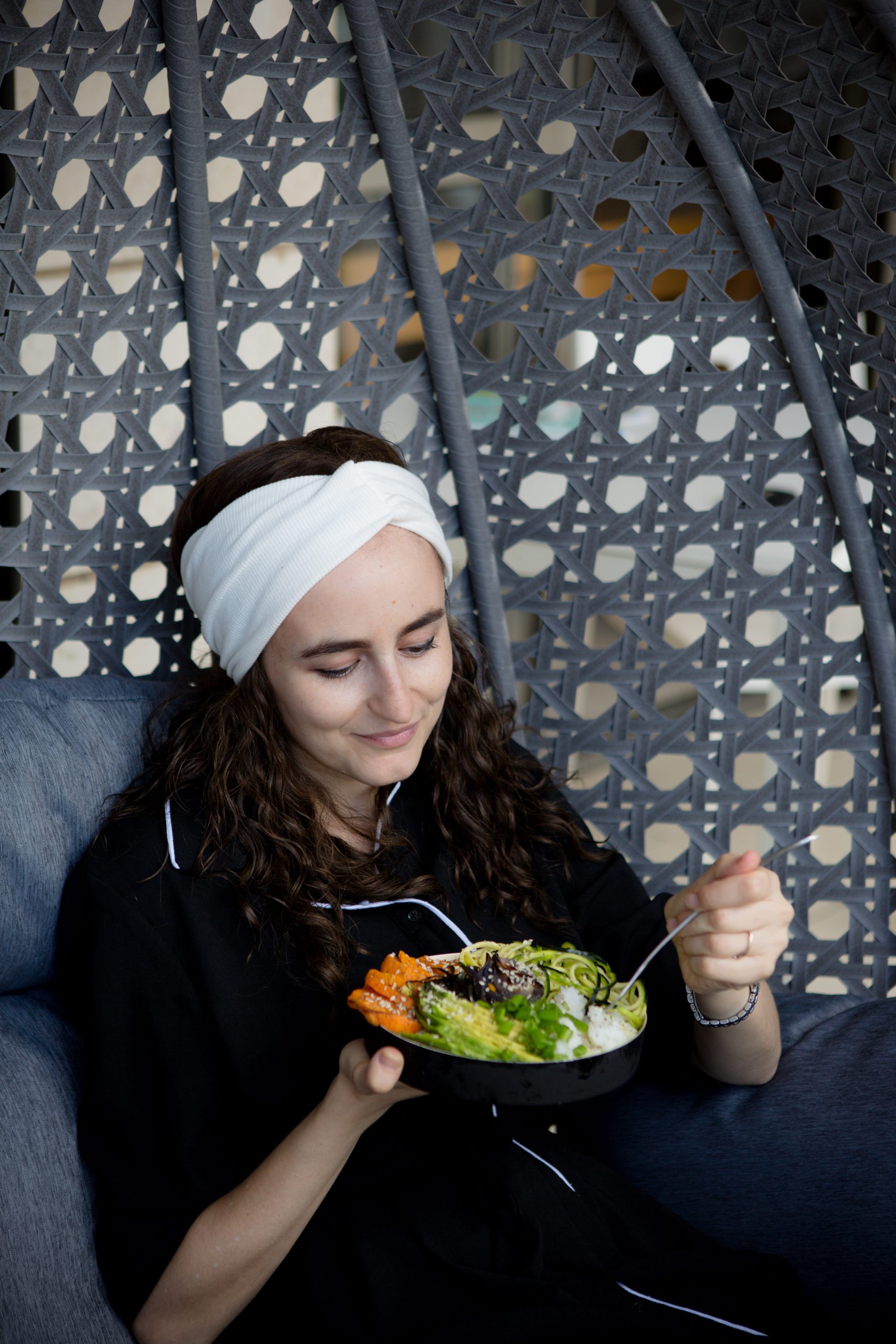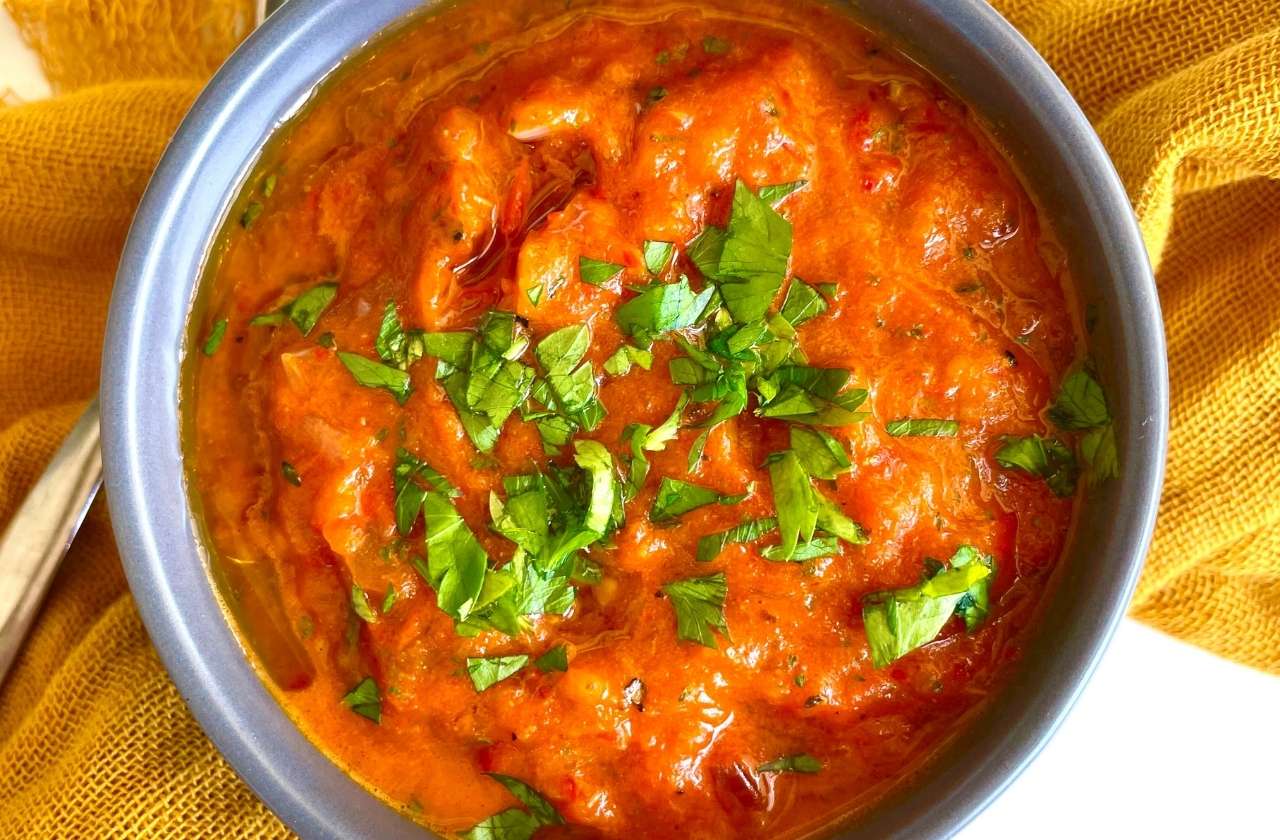Welcome to the Inside Scoop, a new feature to our Food Section. Every few months we present an interview with a celebrity chef. Women, and yes the occasional man, who have impacted today’s world of Kosher Cuisine. Whether they are professionally trained and cook in a restaurant, or are known because of their online blog, they have changed the face of how kosher food is perceived and seen in the world of cooking.
This month, in honor of Veganuary, we spoke with Vegan Chef and Entrepreneur Bayla Haskel. We hope you enjoy this feature and would love to hear feedback and suggestions for future interviews from you. Please reach out and let us know your thoughts.
Beteavon!
Shoshana Isaacson
The Inside Scoop with Bayla Haskel
By Shoshana Isaacson
Bayla Haskel may not be a household name around the world yet, but in Israel her name is starting to become recognized in the culinary world. A wife and mother of a growing family she has taken her passion for healthy, clean eating and turned it into a thriving business. Veg It Out! is an online Israeli based prepared meal service that delivers certified kosher, vegan meals to its clients’ homes throughout Israel. As per the website, Bayla “has made it her mission to not let people’s exhaustion at the end of a long day at work get in the way of eating really good food that is amazing for their bodies.” It was an absolute pleasure to talk about her journey from corporate business to her current venture.
Unorthoboxed: Since many of our readers may not be familiar with you or your company yet, can you start by telling us a little bit about yourself; where you grew up and what brought you to Israel.
Bayla: I am originally from Englewood, NJ. It’s near Teaneck. I grew up Modern Orthodox which is really typical of that area. My mother is the owner and CEO of a lingerie company so I was around fashion and business my whole life and I am the oldest of 8 children. I went to Israel to attend seminary in 2008 / 2009 and although I hadn’t been necessarily very Zionistic before, the Torah learning all seemed to be leading up to coming to Israel and there was this moment that was just “Duh! This is the whole point.” My mother taught me that it was important to have a career and be able to support myself. She emphasized being career-focused as I became more observant because she was afraid she would lose me to religion. So I had interned with different fashion companies in the States while in high school. Even when I was in Israel in seminary I checked out different fashion companies because that was what I knew, and as I started meeting people I realized that Israel wasn’t this Third World Charedi country that I had thought it was before coming and I began to believe I could make a life here.
Unorthoboxed: It’s so interesting to hear how your preconceptions of what Israel is changed during your seminary year. When exactly did you make aliyah?
Bayla: I ended up staying in Israel for a second year of seminary. I chose to go to a more Israeli program at this point because I didn’t know Hebrew very well and I felt that if I was staying I needed to know the culture and the language. I also did Sherut Leumi (public service in lieu of the army). During that year I made aliyah, and also met my husband. I then went to Bar Ilan University and studied for a degree in Economics and Political Science, because unlike in the States there was no program that offered business and arts. During my first year at Bar Ilan I had a son and then during my third year I had my second child. I stayed at Bar Ilan and took an accelerated MBA program. At that time my life was all about business.
Unorthoboxed: Between your MBA and having children, were you also working?
Bayla: Towards the end of my MBA I got a student job at Intel working in business development. After a few months someone left and that turned into a full-time position for me. The department I was working in got transferred to Mobileye when Intel purchased them. During that time I had my third child and I left to work for a startup that was made up of all former Intel people. At Intel they fed us three meals a day. There would be breakfast, very Israeli style with lots of salads; lunch was in a full-on lunch room, again with lots of salads and prepared foods. At the startup we were a bit more scrappy so people would bring in their own food. During that time I got into cooking.
Unorthoboxed: I can see how all of this business background really supported starting your own company, but Veg It Out is a leap from the world of tech. Was there ever a time that you saw yourself working in the food industry?
Bayla: As a kid I was obsessed with cooking shows like Rachel Ray and all the shows on Food Network. When I came to Israel there was Master Chef. It was always just something I was very into and I would always experiment with foods and salads. I remember in tenth grade saying I wanted to be a cook and my friends’ reactions were less than enthusiastic. It wasn’t really looked at as a profession to aspire to. They were all saying things like, “I want to be a scientist” or “I want to be a . . . “ and I would say I wanted to be a cook and they would all say, “No, you can’t be a cook.” I was told it wouldn’t be intellectually stimulating enough for me.
Unorthoboxed: Oh, oh my goodness.
Bayla: I know, people have their fixed opinions, and unfortunately I let those opinions get in the way. So, yes I was always into cooking and then on the veggie side; because of course Veg it Out is a vegan company, I was always advocating on how to eat veggies and how to prepare them and love them and not just as a side to steak. I have always been obsessed with trying new foods. When I was a child my older relatives were not so into vegetables. I guess it must be a generational thing that they grew up at a time when canned vegetables were the norm and probably really awful. I remember going to a resort in the Catskills with all of my family and the meal was served with creamed spinach, none of them would touch spinach so they all put their portions onto a plate and there I was, this little girl of 5, maybe 6, eating spoonfuls of the spinach. Or with my cousins who didn’t eat much of anything I was always trying to get them to taste new foods.
Unorthoboxed: Are you vegan? I mean you run a vegan food service, are you actually a practicing vegan?
Bayla: So, there is a lot between what I have shared and the answer to that question. During the time I was working at the start-up, people were all making their own meals, but we were all busy and it was hectic and I was personally interested in eating healthier. Before going vegan I got into plant based which is not exactly vegan. My father had gotten sick with leukemia and that was a catalyst for all of this. Like any good millennial I started to search the web and I Googled “what causes cancer?” And I would get pop-ups, and as I was searching a random pop-up was a video that was talking about all of the money being spent on medications for cancer treatment, and searching for a cure but almost nothing was being spent on prevention. I started to dig into this and discovered that the typical Western Diet used to be considered the wealthy man’s diet. Looking back through history, who would eat all of the rich, heavy foods like meat and sauces? The wealthy. And who suffered from these awful illnesses like cancer, diabetes, and gout? Poor people were dying of other things, but the diseases we fear today were really for the wealthy, not the common man.
As the economies and social structures changed, these foods became more accessible to everyone and as in the twentieth century, post-WWII canned and convenience items became widely available. The more mass-produced our foods have become, the less flavorful and the less nutrient rich they are. Even our livestock. We have become so used to eating foods out of season, shipped across far distances. All of this has an effect on how the foods we eat affect us. I started reading books by Michael Pollen. He has one called The Omnivore’s Dilemma and another called “In Defense of Food”. He doesn’t advocate veganism and his views are not science based, neither is he a nutritionist, but he focuses on the fact that people used to eat real food – not overly processed or overly farmed.
So I first started to get rid of things like ketchup, which was a huge staple in my home, and mayonnaise and things like that. Because I was getting rid of all of these condiments that allowed me to throw a quick meal together, I had to become much more creative in my cooking. To enhance our food I started making my own pesto, salsa, and teriyaki sauce and this was a turning point from just liking to cook and watching cooking shows, to really learning how to cook., how to use different spices. Randomly at this time I had gotten a cookbook called Jerusalem by chef and restaurateur Yotam Ottolenghi, an Israeli-born chef who livesin England and has restaurants there. He isn’t vegan, there are recipes for chicken and fish in his book, but he is very heavy on vegetables, a very Middle Eastern type of cuisine.
From this I really started to learn how to use all of the more Israeli-type of spices. I started to take his very complicated recipes and figure out how to make foods with the same flavors and tastes but in an easier way. I also watched a bunch of documentaries at this time on the commercial food industry and being a religious Jew, veganism felt like the right thing for me. . . I mean I am not this big animal lover in a fanatical sense, we have a dog, but seeing how animals were being raised for the food industry just didn’t feel right to me. In an ethical way.
The app offers step-by-step instructions including a shopping list, how you can customize the plan for your family for size, or for if you don’t want a certain ingredient. It takes the thinking out of it, because all of the thinking and planning and trying to make the food interesting takes eating healthy from being desirable to feeling unattainable, and then we just give up before we start.
Unorthoboxed: I completely get what you are saying, there does seem to be something off about the mass production of meat and poultry in even the kosher world.
Bayla: I mean I have talked about this before and I have my beliefs but I try not to talk about this on my blog or on Veg It Out! I post recipes and of course they are all vegan but I really try not to proselytize veganism. I feel the same way actually with religion. It shouldn’t be forced or pushed. I prefer them to come to it through loving vegetables.
Unorthoboxed: So I have been reading a lot about vegetarianism, veganism, and plant-based diet in preparation for this month’s articles and this conversation, and personally in my own home we aren’t vegan but we eat about seventy to eighty percent of our meals either vegetarian or vegan. Big change for my meat and potatoes husband. I also understand what you mean about not preaching and keeping your blog and your website about the food. So let’s get back to how from all of these changes in your personal life you made the leap from the corporate world of high tech to owning your current business?
Bayla: So I actually ended up leaving the start-up, it actually closed down a month after I left. I saw things weren’t happening and left before they shut down. At that time I was looking for a position but in the niche field I was looking for, nothing was coming to fruition. I took it as a sign and I went to my husband and said I am going to work on a farm or I am going to go to culinary school. I had been the major breadwinner in our home, so it was a little scary. My husband asked me to come up with a plan. So, I went back and came up with a plan. I had an idea for a business, not what I am doing now. But I put something down on the table and I started doing market research. Business basics 101.
With this in mind I joined every vegan Facebook group that existed and just like religion – veganism is a kind of religion – there are the more moderate that are focused on the food and then there are the extremists. But I learned a lot from these groups and conversations.
…the more invested each of us is in what goes on the table, the more likely we all are to eat it.
Basically, I started experimenting with what I had. I had been playing with recipes for a while at this point and I had made my sister a cookbook of all of my recipes, so I really started paying attention and writing down what i was doing, So I had all of these recipes, maybe thirty or forty and I started making them again and taking better pictures and I would post them onto the different Facebook groups and I made a Wix website and put the recipes up and started to see what responses I would get. I mean I knew nothing really about the vegan world, other than I was starting to cook vegan and I was drawing a lot of attention to my site. Hundreds and then thousands of people were starting to look at my recipes. There was no focus on the Jewish world or kosher, it was just vegan. Besides looking at the web responses, I was also talking to people on the phone, friends of friends, people that replied to my ads on Israeli Facebook groups. I had a Google form with questions that I would fill out while I spoke to people on the phone. All of this was to see if there were things that people had in common, what were the things that mattered to them. I really knew nothing but the theme that kept coming up over and over was people saying, “I am exhausted at the end of the day, I have no time to cook for myself and I buy take-out twice a week.” They were also saying, “I want to eat healthier but there is no time.”
Unorthoboxed: Take-out that often, that’s crazy.
Bayla: I know, right? Even when I was working in the high-tech world with a budget for take-out, I was cooking every night. So my original idea for a business had been to do something along the lines of Hello Fresh, like in the US, but vegan. The answers I was getting from people, however, didn’t line up with that. People didn’t want to cook. They were too tired. So I started making the meals from home. From the beginning the meals were going to be vegan, but it wasn’t clear to me yet if I was going to offer an add-on of an animal protein, like chicken or salmon. So I just started locally. I made a website and I was about to launch, I had a few clients lined up and then my son got Corona. So the time we spent in isolation postponed the launch of Veg It Out, but it gave me time to tweak things. For the first six months I was cooking the meals myself. Packaging them and delivering them. At this point I was making about 70 meals a week and I was really feeling it. I would get on the phone with my mother, my Mom is my business consultant, and I was literally crying to her every week that it was too much.
Unorthoboxed: From your website it appears that Veg It Out is no longer a home-based business.
Bayla: No it isn’t. I did this for six months and it became clear to me that I am not the one to cook the food, nor do I want to be. I developed the recipes, I developed how the bowls look, I learned how things need to be bagged up for delivery etc. The first thing I did was find a delivery company that I am still working with today. The next thing was to find a kitchen where they would make the food for me. They had to have kosher certification, that was very important to me. I also had to be confident that they would follow my recipes and make all of the bowls to my specifications. So basically, I outsource to them. To keep things vegan they can’t adjust the recipes at all, nothing can be added in, just like in kashrut. Now that the cooking is being outsourced, the number of meals that are produced each week has tripled. We are hoping that things will keep growing. This month will be a year that I have been working with this kitchen.
Unorthoboxed: Such a roundabout journey but so intriguing. The concept of Veg It Out! is really amazing and the website is also very well put together. I wish I were in Israel to give it a try. I have a few lighter questions. What is your favorite comfort food? Like when you’re looking for something nostalgic and soul warming.
Bayla: Comfort food. . . I know sushi isn’t a classic comfort food but if I was in a crummy mood and I wanted a meal it would definitely be sushi.
Unorthoboxed: I was going to ask if there were any foods you miss now that you follow a mostly vegan diet, but from our conversation you seem to have a flexible approach to your personal diet. So is there anything that you miss or occasionally get a craving for that isn’t vegan?
Bayla: Occasionally I will have some animal protein, especially on Shabbat as I still am cooking for my family and they don’t follow a strict vegan diet. I guess I would call myself a vegan idealist. In an ideal world I would be completely vegan. For personal health reasons I have had to adjust my diet a bit as things like legumes and lentils were really hard on my stomach. I can say that I haven’t had red meat in about six or seven years, and again for health reasons I avoid it, but there are times when I do get a yen for a nice lamb chop or something along those lines, but I don’t cave into those.
Unorthoboxed: Where do you see yourself in ten years, personally with Veg It Out?
Bayla: I don’t know if it will be in ten years but at some point I have this vision of Veg It Out being the “Strauss” equivalent in the Israeli vegan food market. Having packaged items, not just the prepared meals, but still staying true to the concept of these things not being processed, no additives or preservatives.
Unorthoboxed: Thank you so much for talking with me. You have given over quite a bit for our readers to consider and think about. Maybe even sparked some interest in a vegan or plant-based diet.
Bayla: Thank you for giving me an opportunity to talk about my passion. For your readers in Israel, I would like to offer them a one-time 20% discount on their first order from Veg It Out. They can use code: Unorthoboxed20
Unorthoboxed: Thank you! That is extremely nice of you.
As an added bonus Bayla has graciously given UNORTHOBOXED two recipes to share with you. These recipes courtesy of Bayla Haskel and Vegitout.com

